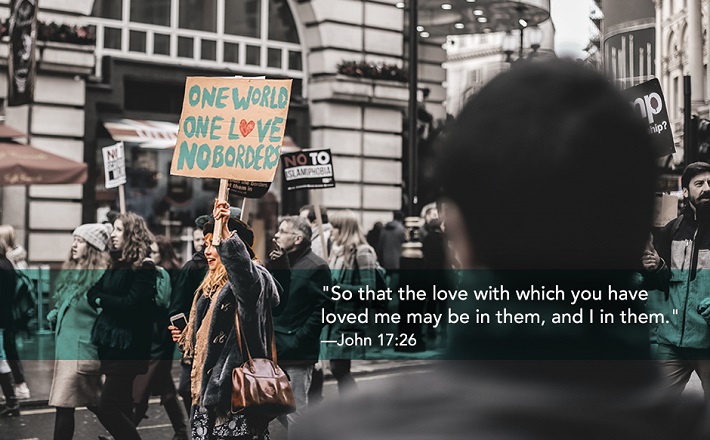Commentary on Psalm 97
Psalm 97 appears in a grouping of psalms that have as their main subject the reign of God (Psalms 93, 95-99; see also Psalm 47).
Scholars often refer to these psalms as “enthronement psalms” because of they focus on God’s eternal kingship. The declaration, “the lord is king!” (verse 1) here sets Israel’s God above the gods of the nations and so vindicates those who worship the true God (verses 6-9). To say the lord is king is not a claim of monotheism per se, that is, the belief in one God. The psalm acknowledges other deities (verse 9), but exalts God as the true authority over the world. The psalm also portrays the other deities as powerless before the true God. They have no more power than the idols that represent them and, therefore, those who worship them are utterly foolish (verse 7).
The enthronement psalms have an important place in the Psalter. Namely, Book IV of the Psalter (Psalms 90-106) addresses the theological crisis created when Babylon destroyed Jerusalem and deported many of its citizens in 587 B.C.E. That event raised questions about the legitimacy of God’s promises to God’s people and God’s choice of David and Jerusalem to mediate God’s reign. Psalms in the previous section of the Psalter (Psalms 73-89) painfully relate doubts about these core beliefs. But Psalm 97 along with the other enthronement psalms remind those who doubted God was still in control, that God was still “most high over all the earth” (verse 9; see Psalm 83:18).
The psalm has three parts. Verses 1-5 begin with the central claim of the psalm (“the lord is king!”) and then describe the majesty of God’s appearance and the display of God’s power. After the initial statement that God is king, verse 1 invites the created order (“the earth”) even to its margins (“the many coastlands”) to join in the celebration. Verses 2-5 take worshippers “imaginatively into the royal presence.”1 The language evokes common images of a warrior God who appears in the storm and in whose presence the earth trembles (verses 4-5). These images were common in the religious expressions of Canaan and Mesopotamia.
The second section of the psalm (verses 6-9) reports the response of the creation to God’s appearance. “The heavens” and “all the peoples” (verse 6) identify worshippers above and below the dome of the heavens (Gen. 1:6-10), thus stating that all creatures recognize God’s glory. Verse 7 suggests, however, that some do not recognize God’s kingship. God’s appearance implicitly shames them, those who worship the images of other gods. In contrast to the worshippers of images, the residents of Zion and Judah rejoice for they know God’s place above the creation (verses 8-9).
Verses 10-12 tell what the kingship of the lord means for the righteous. “Righteous” in the psalms refers to those who live humbly before God and seek God as their refuge (see Psalm 37:39-40).2 In Psalm 97 this label applies specifically to the people of Judah who have suffered at the hands of enemies and now await salvation. The description of them and the arrival of God’s deliverance is similar to passages in Isaiah that speak similarly of God’s devastated people (Isaiah 58:10; 60:1-3). Psalm 97:11, like Isaiah 60:1-3, speaks of the time of salvation as light that shines in the darkness for the righteous. Thus, the psalm ends with a call to the righteous to “rejoice” and “give thanks” (verse 12).
If the main subject of Psalm 97 is the lord’s reign, the word pair “righteousness and justice” define God’s kingship. Verse 2 proclaims that “righteousness and justice are the foundations of his throne.” That is, God’s kingdom does not rest on pure power, but on doing what is right. In this statement Psalm 97 reaffirms the core claim of Psalm 82 that justice is God’s central concern and with that God oversees the world. In Psalm 97, as in Psalm 82, justice involves the defense of those who are victims of abuse at the hands of the wicked (verse 10).
The second portion of the psalm states that God’s creatures recognize righteousness and justice as the core elements of God’s rule. The heavens “proclaim his righteousness” (verse 6) and Zion and Judah are glad because of God’s acts of justice (verse 8; “your judgments”). These qualities of God’s character and actions are the basis of worship and cause for thanksgiving (verse 12).
Both the content and contexts of Psalm 97 make it an ideal passage for the Easter season. The claim of God’s reign and of God rescuing the righteous from the hands of the wicked fit well into Easter’s celebration of God vindicating Jesus by raising him from the dead (Romans 1:4). The psalm’s assurance to the worshipping community that God’s justice would prevail is also like Jesus’ prayer John 17:20-27, another lectionary reading for the sixth Sunday of Easter. Jesus prays that his followers would see his glory as Psalm 97:6 declares that all people see the glory of God’s appearance.
At this late stage in the celebration of Easter the church is also focusing on God’s revelation to the Gentiles, as Acts 16:16-24 narrates. The universal nature of God’s reign and the invitations to the “coastlands” to celebrate God’s kingship in Psalm 97 make the psalm an appropriate passage to pair with Acts’ account of Paul and Silas offering the Gospel to the Philippian jailor.
Each of the lectionary readings also have in their background the problem of persistent evil and suffering and competing claims to control of the cosmos. Psalm 97 speaks to them with the belief that God will appear with righteousness and justice to bring the creation to completion (see especially Revelation 22:12-14, 16-17, 20-21). On that day the righteous will rejoice. The confident message of the psalm is eschatological. It speaks of God’s reign in a world that seems under the control of evil. It speaks so confidently, however, for the same reason John wrote the words of Jesus so boldly: “Surely I am coming soon” (Revelation 22:20).
Notes:
- James L. Mays, Psalms (Interpretation: A Bible Commentary for Teaching and Preaching; Louisville: Westminster John Knox Press, 1994), p. 310.
- Jerome F. D. Creach, The Destiny of the Righteous in the Psalms (St. Louis: Chalice Press, 2008).


June 2, 2019